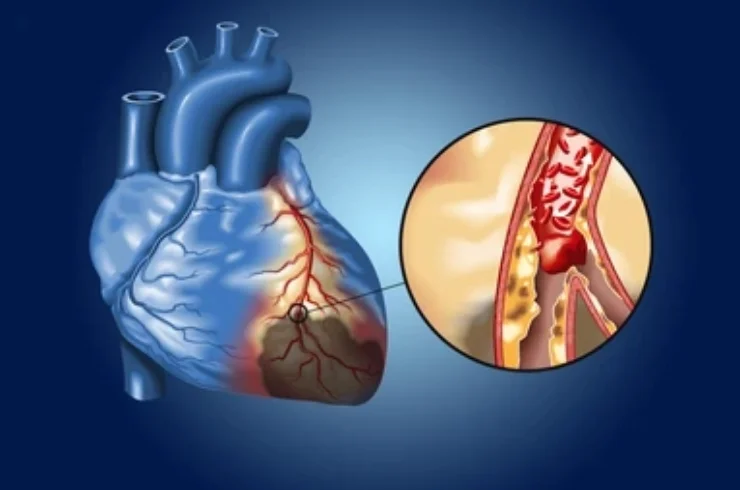Coronary Artery Disease

Coronary Artery Disease (CAD), also known as coronary heart disease (CHD), is a condition where the coronary arteries (blood vessels that supply blood to the heart muscle) become narrowed or blocked due to the buildup of fatty deposits or plaque. This restricts blood flow to the heart, increasing the risk of heart attacks, angina (chest pain), and other serious heart conditions.
At Kurnool Cardiac Center, we specialize in the diagnosis, treatment, and management of CAD to help improve your heart health and overall well-being.
Causes of Coronary Artery Disease
The primary cause of CAD is the buildup of plaque in the coronary arteries. This process, called atherosclerosis, begins when cholesterol, fats, and other substances in the blood form deposits on the walls of the arteries. Over time, these deposits harden and narrow the arteries, leading to restricted blood flow.
Risk Factors for CAD Include:
- Unhealthy Diet: High intake of fats, sugars, and salt.
- Sedentary Lifestyle: Lack of exercise contributes to obesity and poor cardiovascular health.
- Smoking: Smoking damages blood vessels and accelerates plaque buildup.
- Chronic Conditions: Diabetes, high blood pressure, and high cholesterol are key contributors.
- Family History: A family history of heart disease can increase your risk.
- Age: The risk of CAD increases with age, especially for men over 45 and women over 55.
- Stress: Chronic stress can contribute to the development of heart disease.
Symptoms of Coronary Artery Disease
In the early stages, CAD may not cause noticeable symptoms, but as the disease progresses, it can lead to serious heart problems. Common symptoms include:
- Chest Pain (Angina): A feeling of tightness or pressure in the chest, often triggered by physical exertion or stress.
- Shortness of Breath: Difficulty breathing, especially during physical activity.
- Fatigue: Unexplained tiredness or weakness.
- Dizziness or Lightheadedness: A feeling of faintness, especially with exertion.
- Heart Palpitations: Irregular or fast heartbeats.
If you experience chest pain or any of these symptoms, seek medical attention immediately as they could indicate a heart attack.
Diagnosis of Coronary Artery Disease
At Kurnool Cardiac Center, we use advanced diagnostic techniques to evaluate your heart health and determine the presence and severity of CAD. These include:
- Electrocardiogram (ECG): Measures electrical activity of the heart and helps detect heart rhythm abnormalities.
- Echocardiogram (2D Echo): Uses sound waves to create images of the heart’s structure and function.
- Treadmill Stress Test (TMT): Assesses how the heart performs under physical stress.
- Angiogram: A special X-ray procedure to visualize the coronary arteries and detect blockages.
- CT Angiography: A non-invasive method to assess the coronary arteries using a CT scan.
Treatment for Coronary Artery Disease
Treatment for CAD depends on the severity of the condition and may include lifestyle changes, medications, or surgical interventions.
Lifestyle Changes
- Heart-Healthy Diet: Reduce intake of saturated fats, trans fats, and sodium. Increase consumption of fruits, vegetables, whole grains, and lean proteins.
- Exercise: Regular physical activity helps improve circulation and heart health.
- Quit Smoking: Smoking accelerates the progression of CAD.
- Stress Management: Techniques like meditation, yoga, and relaxation exercises can reduce stress.
Medications
- Statins: To lower LDL (bad cholesterol) levels.
- Aspirin: To reduce blood clotting and prevent heart attacks.
- Beta-Blockers: Help control blood pressure and reduce the heart’s workload.
- Nitroglycerin: Relieves chest pain by relaxing blood vessels.
Procedures
- Angioplasty (Percutaneous Coronary Intervention – PCI): A minimally invasive procedure to open up blocked arteries using a balloon or stent.
- Coronary Artery Bypass Surgery (CABG): In severe cases, surgery may be required to bypass blocked arteries and restore blood flow to the heart.
- Laser Angioplasty: A newer procedure that uses a laser to remove plaque from arteries.
Prevention of Coronary Artery Disease
Preventing CAD is essential to maintaining a healthy heart. Some key steps to reduce your risk include:
- Healthy Diet: Focus on a balanced, heart-healthy diet rich in fruits, vegetables, whole grains, and healthy fats.
- Regular Exercise: Aim for at least 30 minutes of moderate-intensity exercise on most days.
- Manage Stress: Practice relaxation techniques to manage stress effectively.
- Control Blood Pressure and Cholesterol: Regularly monitor and manage these important risk factors.
- Avoid Smoking: Smoking is a leading cause of CAD and its complications.
Why Choose Kurnool Cardiac Center for Coronary Artery Disease?
At Kurnool Cardiac Center, we offer comprehensive care for patients with coronary artery disease. Our expert cardiologists, led by Dr. Nagendra Prasad Thota, specialize in the diagnosis, treatment, and prevention of CAD. We provide:
- Advanced Diagnostic Tools: State-of-the-art technologies like angiograms and echocardiograms for precise diagnosis.
- Personalized Treatment Plans: Tailored therapies based on your specific condition and risk factors.
- Minimally Invasive Procedures: Angioplasty and other interventions to treat blockages with minimal recovery time.
- Comprehensive Care: From lifestyle counseling to advanced treatments, we are with you at every step of your heart health journey.
Treatments
- ECG
- 2D Echo
- TMT (Treadmill Test)
- Angiogram
- Angioplasty
- Bypass Surgery
- Heart Failure
- Valvular Heart Diseas
- Arrhythmias
- Cardiomyopathy
- Congenital Heart Defects
- Lipid Disorders
- Coronary Artery Disease
- Coronary Angioplasty and Stenting
- Percutaneous Coronary Intervention
- Coronary Artery Bypass Grafting
- Mitral Valve Repair or Replacement
- Atrial Septal Defect Closure
Consult Kurnool’s Leading Heart Specialist
Reach out to Kurnool Cardiac Center and meet Dr. Nagendra Prasad Thota for advanced diagnostics and treatment.
